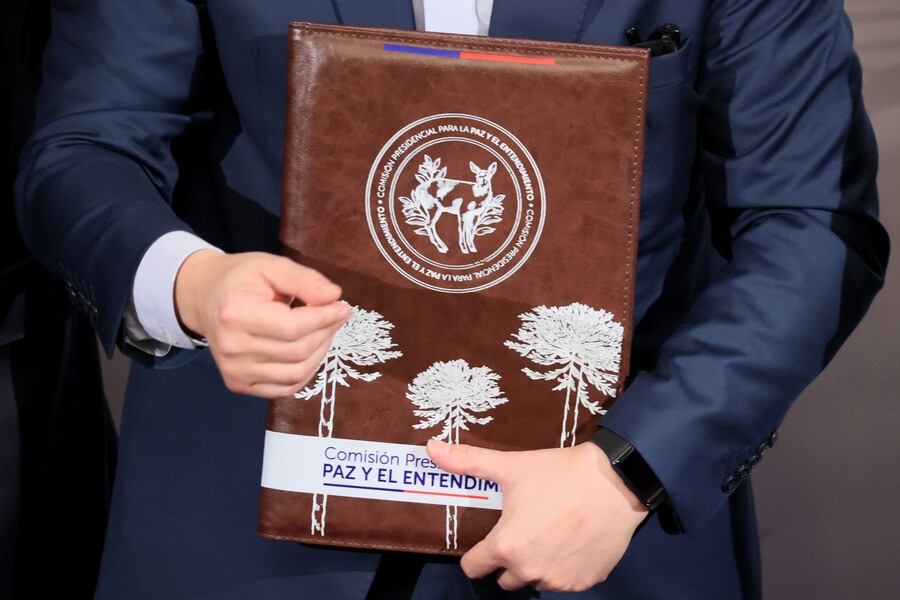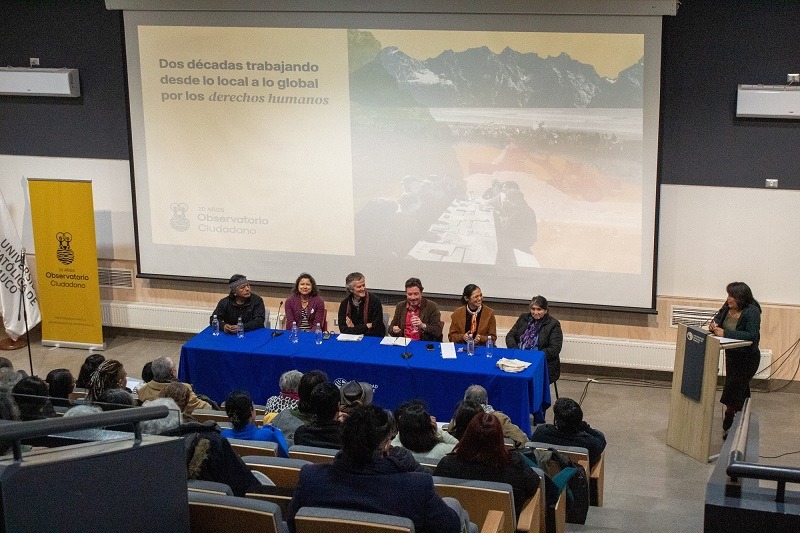- It was noted that denounced issues in Chile are proof of prevailing unfulfillment of the State on international agreements in the context of social protests. There is the risk of right violations repeating.
- Moreover, Sebastián Piñera’s government was called out to responsiby look for a solution to the conflict
Santiago November 6, 2019.- The International Observation Mission work started this morning, regarding Chile’s human rights situation in the context of social protests that started on October 18. A meeting between the international observers and representatives of the National Institute of Human Rights was the first activity in the morning. Later, the Mission held a conference with social organizations -working on human rights and legal defense, as well as professional unions and national observer groups- in order to directly gather information and testimonies of these severe denounces.
Moreover, the Mission formed by 10 observers of different organizations and renown international federations carried out a press conference at noon to explain the objectives, methodology and agenda. About the pecularities of this Mission, Paulina Acevedo, Coordinator of Citizenry and Interculturality Program of Observatorio Ciudadano, says «It is about a historical mission in a really particular moment in terms of human rights demand and social protest in Chile. We can point out repression in social protest in different countries of Latin America, as it articulates capacities and experiences of organization with great competence on human rights violation verification that can happen in these regional contexts.»
Lorena Fries, lawyer and President of Corporación Humanas, notes that actions and the extent of human rights violations are publicly know in the country. “We are very concerned about the situation of women and girls. During all this process they have gone through the different stages of repression, being detained, injured, being victims of sexual violence and even raped. These situations have not necessarily been reported to official State bodies.”
For Chilean organizations, it is of utmost importance that the severe human rights violations reach media. In a context of democracy, we are concerned that such repressive practices will occur again, “citizens have the legitimate right to mobilize, even more for human rights issues” says Fries.
Corporación Humanas’ president notes that main demands of this revolt have to do with the lack of granted social rights that are not recognized. Instead, these rights are given to the market, generating structural inequalities and, consequently, provoking discomfort among people and demonstrations on the streets.
Enrique Font, representative of the World Organisation Against Torture, points out that, regarding the situation in Chile and the received information, there is a continuity of situations that had happened before. “Although the extent of the protests and violation of human rights makes this situation unprecedented, it shows us that this is not new. It rather relies on circumstances that had been happening.»
He recalled that the United Nations Committee against Torture had already emphasized in 2018 the militarization of conflicts, the abusive use of force and firearms and the use of sexual violence as a form of torture in Chile.
One of the mandates of human rights establishes the need of assistance to victims and sanctions, as well as granting that human right violations will not repeat. «This is an opportunity to show what I already saw happening in Chile,» says Font.
To this scenario, the lack of transparency or access to information and a series of questionable actions in regard of human rights must be added.
The International Observation Mission is formed by: the World Organisation Against Torture (OMCT), Front Line Defenders, the Center for Legal and Social Studies (CELS, Argentina), the Argentine League for the Rights of Man – FIDH, the Committee for Human Rights in Latin America (CDHAL, Canada), Artículo 19 (Brazil); CTA- Autónoma (Argentina), Plaza de Mayo Mothers -Founding Line, and Peru Equity.
* The press conference was broadcast via Facebook streaming. Check it out here: https://www.facebook.com/observatoriociudadanochile/videos/2490005154654835/
International Observers
Christina Ayala. responsible of the Audience Education at the Committee for Human Rights in Latin America (CDHAL, Canada). This organization was created in 1976 in Montreal and it focuses on the promotion and diffusion of human rights status in Latin America. It belongs to the America Policy Group (APG), a network of Canadian organizations that work on the Americas, as well as in Québec Association of International Cooperation Organizations (AQOCI).
Christine Keith. International Coordinator of the Global Alliance of Alternatives against Incineration (GAIA) and its Executive Director in the United States. GAIA is a global network of organizations with over 800 grassroots groups, non-governmental organizations GAIA. Christine has 25 years of experience working with international organizations on human rights, health and environmental justice.
Enrique Font. Lawyer and Criminologist. Senior Professor of Criminology and Criminal Policy at Universidad Nacional de Rosario. Member of the World Organisation against Torture (OMCT). Font was part of the Subcommittee on Prevention of Torture and other Cruel, Inhuman or Degrading Treatment or Punishment of the United Nations. He is Commissioner in the National Committee for the Prevention of Torture of the National Prevention Mechanism, Argentina.
Andrés López Cabello. Litigation and legal defense lawyer at Center of Legal and Social Studies (CELS), a human rights organization created in 1979 in Argentina. CELS resorts to universal and regional human rights protection mechanisms participating in international discussions from a Latin American perspective.
Ivi Oliveira. Coordinator of Protection for the Americas at Front Line Defenders. Oliveira is responsible for maintaining and developing networks of human rights defenders all along the Americas, delivering quick responses in cases of human rights in risk, carrying out research missions on threats and attacks. This is accomplished by analyzing and producing important resources to take actions.
Yaizha Campanario Baque. Head of Public Policies and Rights of Indigenous Peoples in Perú EQUIDAD. Campanario works on research, training and advocacy with indigenous communities and organizations in the Peruvian Amazon. Moreover, Campanario focuses on workshop development and researching on topics such as public policies, indigenous people rights and the impact on extractive market on them, and influence on the International System of Human Rights. She is part of the observation mission on behalf of the International Work Group for Indigenous Affairs (IWGIA)
Denise Dora. Executive director, Article 19 Brazil.
Camila Marques. Lawyer and Coordinator of the Legal Reference Center, Article 19, Brazil.
Miriam Elizabeth Liempe. Secretariat of Relations with Indigenous People at CTA- Autonomous (Argentina)
Ayelen Beigbeder. Member of the Argentine League for the Rights of Man, Beigbeder is part of the mission on behalf of the International Federation of Human Rights (FIDH)
Norita Cortiñas. Mothers of Plaza de Mayo – Founding Line. Psychologist, activist and defender of human rights in Argentina, co-founder of the Plaza de Mayo Mothers.
Felipe Gutiérrez Ríos. Journalist, representative of Observatorio Petrolero Sur. Journalist.


